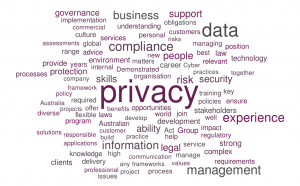
Getting Started in Privacy: Privacy career skills employers want to see on your CV
Working out how to get hired in a field that is relatively new and constantly changing can be challenging – as many new or hopeful privacy professionals know. It can be difficult to know which privacy career skills employers want to see on your CV. Especially since employers aren’t always certain what their privacy needs are themselves. In this blog post, we’ll outline the hard and soft skills we’re seeing Australian employers ask for in their privacy team members:
In-Demand Privacy Career Skills
Based on the Australian privacy job trends we’ve observed over our quarterly job reporting (in September 2021, June 2021, and December 2020), as well as this IAPP article, these are the top skills we recommend privacy professionals cultivate:
Privacy industry experience.
We know, you’re looking to get a job to get experience – but to get a job, you first need experience. It’s a common issue workers face – and it’s even more pronounced in the privacy sphere where very few entry-level roles. However, experience is a key requirement for most positions, with the most common requirement increasing from 3-5 years in our June Jobs report to 5+ years in the September Jobs report.
A law degree helps but isn’t necessary.
In our September Jobs report, 44% of jobs advertised sought a candidate with a law degree – given that a total of 55% of the positions required the candidate to be degree qualified, the demand for law degrees is significant. The rest were flexible, with Business, IT and related degrees being considered.
Even if you don’t have a law degree, demonstrating an ability to read and interpret privacy law can significantly improve your chances. You don’t need to be an expert on all the privacy regulations and legislation from around the globe, but you do need to illustrate that you have the ability to interpret and understand these regulations when necessary.
At the very least, for a job in Australia, you will need to have a solid understanding of the Australian Privacy Principles.
Excellent communication skills are essential.
Most employers place a high emphasis on the ability of their privacy professionals to communicate effectively with the rest of the business and with external stakeholders. This includes a high level of both written and verbal skills.
As a privacy professional you will be liaising with team members at all levels of the organisation and you need to be able to understand their concerns while clearly communicating what is required from a privacy viewpoint.
Make sure you highlight ways you’ve worked collaboratively or used your communication skills, however you can. Think about joining a networking group and offering to do some presentations or running workshops. It’s a great way to get your communications skill noticed plus build your network.
Problem solvers wanted.
Most employers want their privacy professionals to provide them with solutions to what can be complex business process problems. You need to be able to find a way of integrating privacy practices into the organisation without causing too much disruption to its primary purpose.
Being a problem solver is vital for this role. Project management experience is also looked on favourably as many positions involve managing the implementation of new privacy initiatives.
Think about all the ways you might be able to highlight your talents as an analytical thinker and problem solver.
Governance, Risk, Compliance (GRC) experience can help.
Many privacy roles sit within the GRC or Audit and Risk departments. This means experience in these areas will be considered favourably and can even help you make the crossover from a primarily compliance or risk based role to a privacy role. This is one possible way to work around the experience requirements. Even those employers whose privacy roles sit within the legal department will most likely look favourably upon applicants with a strong GRC background. In many organisations, privacy is still seen as primarily a compliance issue. While we know it’s so much more than that, this can work in your favour if you have a background in compliance.
Technical skills can help you fit in.
Basic technical skills can help you talk the talk with IT professionals, which is a major asset in the privacy and cyber security industry.
That is, unless you’re targeting the cyber security profession, in which case you will likely want to have a tertiary IT qualification and relevant network and IT security experience.
A CIPT qualification is a great way for technical people to demonstrate they have a good understanding of privacy issues.

Word cloud from Sep 21 privacy job ads
Steps to Take to Showcase Your Privacy Careers Skills
Here are a few quick things you can do to showcase your privacy career skills to potential employers:
- Update your LinkedIn profile.
Highlight your privacy skills and experience on your LinkedIn profile. It will help you connect with other privacy professionals which may open doors, while also showing employers that you’re serious about working in privacy. Also, if you adjust your settings, you can also receive notifications from LinkedIn when relevant opportunities arise, which can be helpful.
- Join a professional privacy network.
Joining and participating in professional privacy groups can help you stay up to date with developments, improve your professional network, and ensure you’re the first one to know when opportunities in the field arise.
- Get a privacy certification.
Achieving a privacy certification shows employers that you possess the knowledge and professional skills required to promote privacy at their organisation. For those wanting to break into privacy we would highly recommend the IAPP Certified Information Privacy Manager (CIPM) certification. This certification will give you a broad understanding of the fundamentals of developing and maintaining a privacy program. Other certifications to consider are:
- IAPP Certified Information Privacy Technologist (CIPT) – if you are coming from a more technical background
- IAPP Certified Information Privacy Professional – Europe (CIPP/E) – if your role will involve understanding and complying with the GDPR
These certifications set you apart from the other candidates.
The certification and informational training courses provided are overseen by lead instructor Dr Jodie Siganto, one of Australia’s foremost privacy experts. She has significant legal experience, but you don’t have to. The courses are designed for lawyers and non-lawyers alike.
Find out more: https://privacy108.com.au/training/
